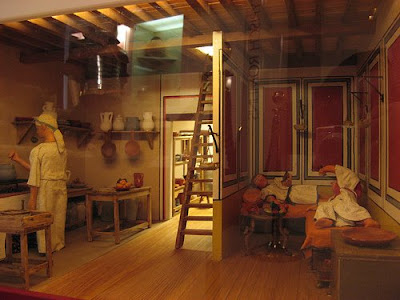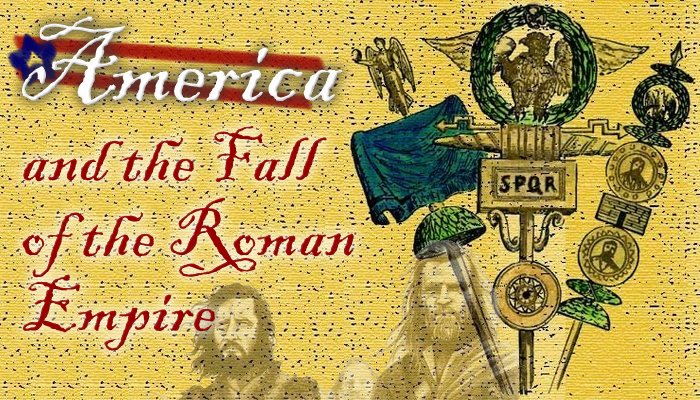 A note from Radarsite: This is the second article in a three part Radarsite series America and the "Fall of the Roman Empire. In the first installment The Strong Horse and the Weak Horse we saw how Rome used its military might to establish itself as a power to be reckoned with. In these following two installments we will eavesdrop on the lively conversation of a group of rather typical upper class Romans at a congenial dinner party. In these interesting and sometimes heated conversations, we find them discussing some of the most pressing issues of the day: “globalization”, “immigration” and, finally, “the Jewish question”. - rg
A note from Radarsite: This is the second article in a three part Radarsite series America and the "Fall of the Roman Empire. In the first installment The Strong Horse and the Weak Horse we saw how Rome used its military might to establish itself as a power to be reckoned with. In these following two installments we will eavesdrop on the lively conversation of a group of rather typical upper class Romans at a congenial dinner party. In these interesting and sometimes heated conversations, we find them discussing some of the most pressing issues of the day: “globalization”, “immigration” and, finally, “the Jewish question”. - rgAlthough, as we have seen, the attempt to equate present-day American foreign policy with that of the Roman Empire does not hold up upon close scrutiny, there are a few interesting parallels between the two. The Romans, like us, loved good food and good conversation, and they loved nothing better than the combination of the two. For the typical upper-class Roman family, in the second half of the First Century A.D., a sumptuous late afternoon dinner in their gaily-frescoed triclinium, with a carefully-chosen group of friends, relatives and clients would be the highlight of the day.

After dinner, and the usual small-talk about who was sleeping with whom, the conversation would most likely turn to the most pressing issues of the day. During this period, three of the hottest topics of conversation would be “globalization”, “immigration” and “the Jewish question”.
As early as the Fourth Century B.C., the Romans began construction of their famous network of ingeniously designed roads (the Via Appia, the most famous of all Roman roads was begun in 312 B.C.). By the time of our congenial dinner party, Roman roads traversed the Empire from the furthermost outpost in Britain to the easternmost Provinces of Pontus and Bithynia.
Not only did they build them, but they used them -- at first for strictly military purposes, but later on, for private and commercial transportation. Where it proved necessary, they protected them.*
Then, in 67 B.C., acting on orders from the Roman Senate, the famous Roman general, Pompey the Great successfully swept the ubiquitous pirates from the waters of the eastern Mediterranean, where they had always preyed upon the major trade routes. Not only did he destroy their ships at sea, but, acting under a special warrant from the Senate, his legions pursued the pirates inland to their home bases and destroyed these also.
Thanks to Pompey’s effective campaign, for the first time in recorded history, the shipping lanes of the eastern Mediterranean became relatively safe.
During most of the First Century B.C., the Roman Empire had been wracked by violent civil wars. However, after Augustus’ victory over the forces of Antony and Cleopatra at the battle of Actium in 31 B.C., a welcome period of peace settled in, which the Romans called the Pax Romana. The benefits of these positive developments were felt almost immediately throughout the Empire. Journeys that had previously taken weeks, or even months and were often difficult and dangerous, were now, thanks to the network of well-maintained and well-protected roads and shipping lanes, accomplished with relative safety and ease in a matter of days. Business and commerce prospered. International (or, in this case, interprovincial) trade flourished. Intricate new systems of credit were invented, and a whole new class of “middlemen” sprang up. Importing and exporting became promising new avenues to wealth and status for adventurous entrepreneurs, regardless of their previous rank in society.

A small potter in Ostia who previously could only hope to sell his wares within the narrow radius of an arduous one-or two-day journey by mule now had potential customers in Britain and Spain. Indeed, shards of First Century Italian-made pottery have been found all over Britain and Northern France. Remnants of Gaulish-manufactured goods are still being unearthed in North Africa. Although it is doubtful that they ever actually used the word “globalization” (or its Latin equivalent), that is exactly what they accomplished. Our Ostian potter was now so successful that he had to expand his pottery business and employ a dozen new workers to keep up with the demand. He purchased a new house in the city, built a small villa at the seaside, and bought three new slaves. Our enterprising Ostian businessman worked hard and was proud of his accomplishments; and he was proud of his Roman citizenship, which entailed so many advantages and protections. Many of these newly-absorbed members of the Roman Empire shared the views of our industrious potter, and looked forward to the day when they, too, could earn Roman citizenship and perhaps even visit Rome, itself.
However, there were some who were not happy with these changes. Certain disgruntled provincials with a religious bent felt that their traditional culture was being subsumed into the hedonistic and materialistic world of Rome. Not only were their historic traditions and local religious customs being neglected, but their ancient native languages were falling into disuse. Nowadays, they complained, almost everyone spoke Latin or Greek and considered themselves, first and foremost, Roman citizens. Everyone dressed like Romans and behaved like Romans.
Their ancient cities, which had once been so culturally unique, were now all beginning to look alike -- like mini-Romes.* As we shall see, some of these unhappy subjects would soon rebel, causing Rome endless problems into the future.
Meanwhile, in Italy itself, not everyone there was pleased with the unexpected repercussions of this new phenomenon of ‘globalization’. Wealthy Italian wineries, which for generations had been producing and exporting their universally popular, but relatively expensive* Falernian wine, suddenly found themselves competing with the cheap but excellent wines of Southern Gaul.
The proud, traditionally Italian-born imperial bodyguards, the Praetorian Guard, saw themselves gradually being replaced by larger*, more militarily proficient Germans who worked for less pay. And glorious Rome, itself, was being inundated daily with streams of unkempt, unruly foreigners -- some of whom didn’t even attempt to assimilate, but moved into their own separate enclaves. Some of these new immigrants never even bothered to learn Latin, or Greek, preferring, instead, to communicate with one another in their native languages. Alas, to the typical Roman it sometimes seemed that the very essence of Roman civilization itself was under siege. Which brings us to the second topic of conversation that evening:
Immigration

Since the first conquests of the early Republic, Rome had experienced a steady influx of foreigners and slaves. After Pompey’s successful Mediterranean venture, tons of booty and thousands of slaves were shipped back to Rome. Following his conquests in Britain and Gaul, Julius Caesar brought back thousands of barbarian slaves and camp followers -- blue-haired, heavily-tattooed Brits; huge, frightening, shaggy-haired Gauls, wrapped in their malodorous animal skins and heavy furs.

By the time of Augustus’ Pax Romana, the slave population of Rome had reached an astonishing 250,000 out of an estimated one million inhabitants. The number of unemployed, or sporadically-employed Romans is unknown, although it was undoubtedly great. Over the years, the number of foreigners flocking to Rome grew exponentially -- Egyptians, Ethiopians, Asiatics, Sardians, Lydians, Frisians, Batavians -- each tending to settle into their own particular neighborhoods, but all together adding to the weight of that great, barely-controllable beast, the Roman mob.
Successions of Roman Emperors had dealt with this mob. At various times they cajoled it, courted it, appeased, placated and bribed it, and when all else failed, tried to intimidate it. But they could never ignore it. Restless, dangerous, easily roused, the Roman mob was an integral and disruptive fact of life throughout the course of the empire. Ruled by violent street gangs and crime lords, there were whole sections of “inner city” Rome where an unarmed Roman citizen dared not enter.
Starting in the First Century B.C., both to placate and distract this unruly populace, Roman authorities instituted the now-famous policy of “bread and circuses”. What had begun as intermittent gifts of surplus grain by the government, soon became formalized into the so-called “corn dole”, later, actually distributing daily loaves of bread. The “circuses” referred to the immensely popular and deadly combats of the arena, to which the populace had easy access.

In the end, of course, this enormous urban welfare program was self-defeating, drawing in countless numbers of poor and unemployable people from across the Empire, and creating a permanent and discontented underclass, which could explode into violent riots at the slightest provocation.* Soon, the dole was perceived by the people as their traditional inalienable right, and no Emperor, not even Augustus, had the courage to curtail it. Although, with the introduction, towards the end of his reign (27 B.C.-14 A.D.), of an urban police force Urban Cohorts and a rudimentary fire department Vigiles, Augustus managed to assume reasonable control over the city, the problems of the dole and unregulated immigration proved intractable.
For that increasingly rare breed, the upper-class pure-bred Roman, these changes were hard to swallow.

Rome was looking more and more un-Roman, and our native Roman’s previously unchallenged supremacy in society was now being brought into question. Uncouth, foreign-born, recently-freed slaves (freedmen) were now becoming businessmen and entrepreneurs, some even managing to become wealthy -- ostentatiously, of course, accumulating huge retinues of household slaves and hangers-on.*
If these disgruntled “genuine” Romans sensed that their traditional privileged role in society was decreasing, it was more than a paranoid delusion. The birth-rate of native-born Romans was, as Augustus noted apprehensively, in rapid decline. Despite the questionable and violent manner in which he had assumed the throne, Augustus was at heart a staunch conservative, who advocated a return to the (supposedly) morally-grounded traditions of Rebublican Rome. Much to the consternation of his more liberal-minded subjects, Augustus introduced numerous laws aimed at promoting “family values”, (even though his own progeny were hardly shining examples of traditional Roman virtue)*. By strengthening the honorable institution of marriage and making the whole process of divorce more difficult, by rewarding parents of large families, and penalizing bachelors, Augustus hoped to both improve the morals of his Roman subjects and reverse the alarming decline in the birthrate.
Unfortunately, his well-intentioned laws accomplished little, as they were generally ignored by an upwardly-mobile generation of energetic young Romans who wanted to enjoy their new found wealth, unencumbered by the worries and cares of family life.
These two major problems of the dole and unchecked immigration would remain largely unresolved throughout the course of the Roman Empire. The population of Rome had more or less reached its peak during Augustus’ reign, and thereafter would sink into a slow, irreversible decline. In the following centuries, the Empire would succumb to yet another series of disruptive civil wars and, as Rome became more and more unstable, the migrations would begin to turn in the other direction. Our rare pure-bred native Roman would become rarer still, until eventually he could only be found in a few isolated, well-fortified estates spread throughout what remained of the Roman Empire.*



No comments:
Post a Comment